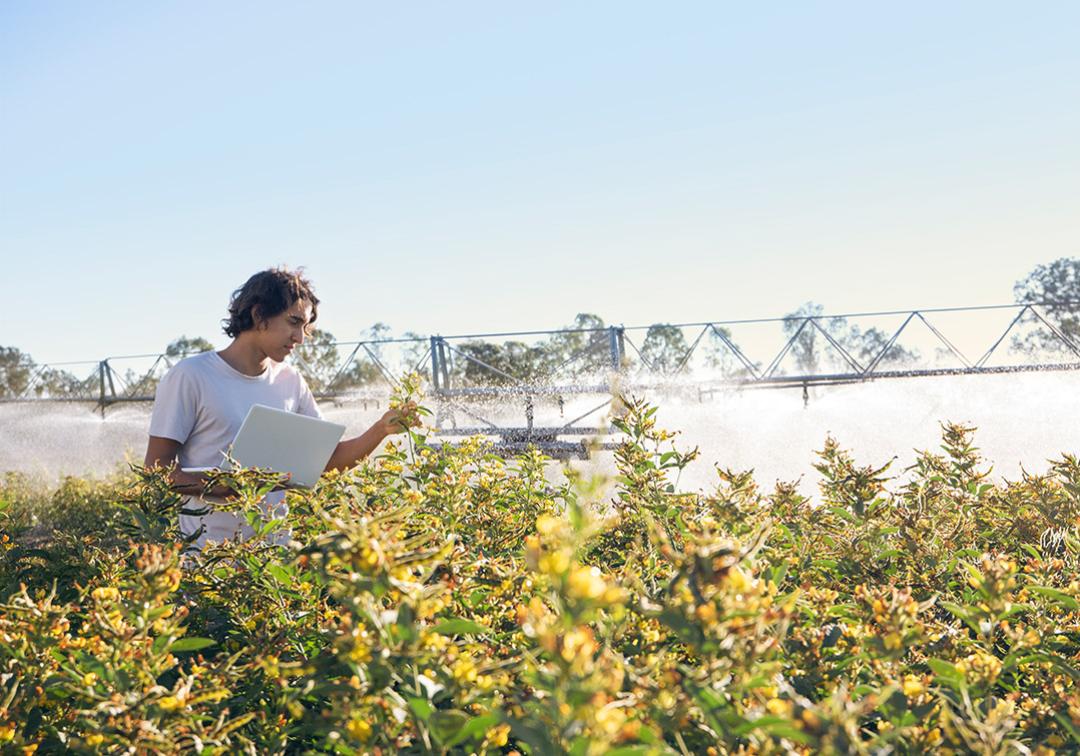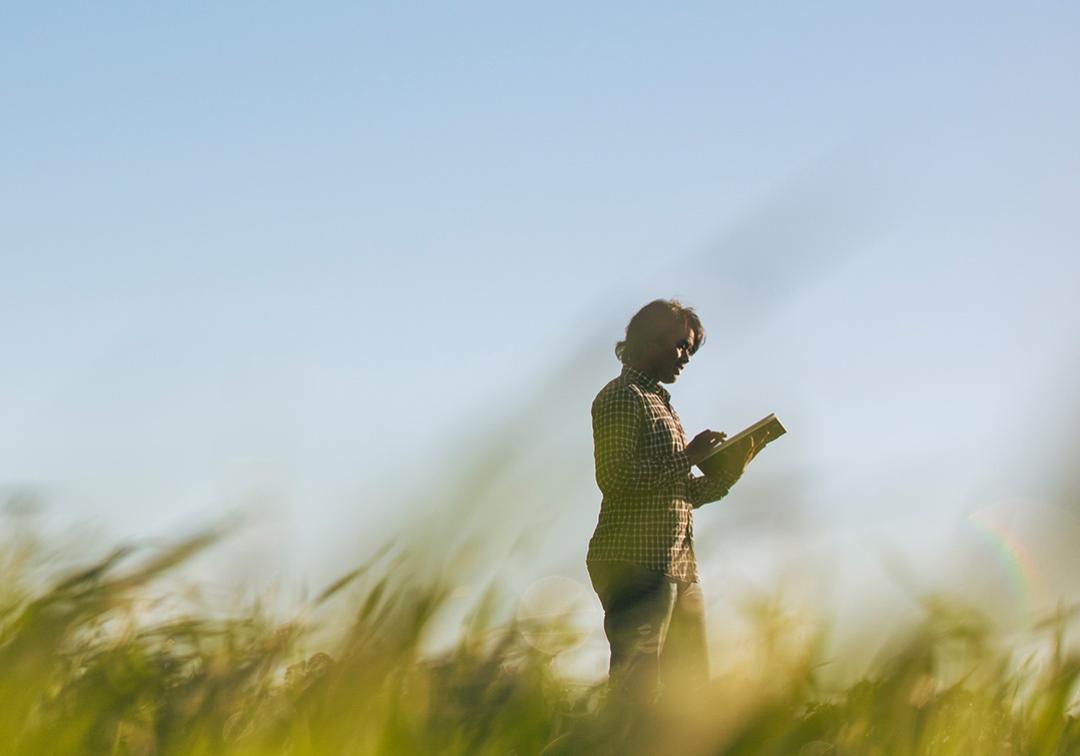
Graduate Certificate in Agricultural Science
Overview
Gain the skills to tackle global environmental challenges and improve agricultural practices anywhere in the world.
As the world’s population continues to expand, demand is high for agricultural scientists.
This program is designed for recent graduates in any field, and for established professionals wanting to upgrade their skills.
Tailor your studies to suit your interests, expanding your career prospects into a wide range of government, commercial, community or research-based roles.
Our highly awarded academics will teach you the latest advances in agricultural science, including precision agriculture techniques, genetic technologies and sustainable resource management.
Access some of the best animal and agricultural facilities in the Southern Hemisphere, specialist research greenhouses, and more than 1,000 hectares of working farmland.
Graduate ready to apply leadership, research and problem-solving skills to meet the global challenges associated with feeding the world and maintaining our environment in the areas of animal welfare, biosecurity concerns, and competition for limited resources.
The Graduate Certificate in Agricultural Science can provide a pathway into the master's program.
Program highlights
- Access some of the best animal and agricultural facilities in the Southern Hemisphere across more than 1,000 hectares of subtropical farmland.
- Learn from highly awarded academics who are world leaders in their disciplines.
- Build your leadership skills with courses in rural leadership, entrepreneurship and international agricultural development.
How you'll learn
Your learning experiences are designed to best suit the learning outcomes of the courses you choose.
- Lectures
- Tutorials
- Research experience
- Laboratory work
- Fieldwork
What you'll study
At UQ, degrees are called 'programs' and subjects are called 'courses'. Here's a sample of the courses you could study in this program:
- Advanced Agronomy
- Animal Science and Production
- Global Challenges in Agriculture
- Leadership in Rural Industries and Communities
Career possibilities
Postgraduate study can take you anywhere. Here are some of the careers you could be on your way to:
- Agricultural consultant
- Animal research scientist
- Agricultural economist
- Extension and inspection officer
- Land information systems officer
Average annual salary range
Protection Officer
seek.com.au
Average annual salary range
Agronomist
seek.com.au
Next steps after graduation
As the world’s population continues to expand, demand is high for agricultural scientists. A study from the Australian Farm Institute found there were 6 jobs to every agricultural university graduate in Australia in 2021.
You will find diverse career opportunities in organisations such as:
- local, national and international agribusiness companies such as agricultural service companies, banks, seed companies, food producers and agricultural consultancies
- research institutions, including universities and CSIRO
- local, state or federal government departments
- biosecurity, extension and animal production enterprises
- small- or large-scale organisations involved in production, post-harvest and marketing of horticultural products
- feed mills, stock equipment manufacturers, and livestock and poultry health companies within allied industries.
Alternatively, you can further your research ambitions and continue into the Master of Agricultural Science.
Events
See all events
29 June
Queensland Biology Winter School, Year 12

1 July
International Baccalaureate Research Skills Program
Stories
See all stories
Careers
Career opportunities in agricultural science
4-minute read

Uni life
What's it really like to study agribusiness and agriculture at UQ?
5-minute read
Stories
See all stories
Careers
Career opportunities in agricultural science
4-minute read

Uni life
What's it really like to study agribusiness and agriculture at UQ?
5-minute read
Entry requirements
Entry requirements
To be eligible for entry, you'll need:
- a bachelor's degree (or equivalent) in any discipline, or
- 2 years full-time equivalent, relevant work experience (see below).
- a bachelor's degree (or equivalent) in any discipline, or
- 2 years full-time equivalent, relevant work experience (see below).
Relevant work experience
Relevant work experience means work:
- in agronomy and/or horticultural crop production/protection roles, or
- in environmental management and restoration roles, or
- in any other profession where you’ve built a portfolio demonstrating your agricultural science expertise.
Related programs
Depending on your previous qualifications and current goals, you might want to consider
one of these related programs:
English language requirements
IELTS overall 6.5; reading 6; writing 6; speaking 6; listening 6. For other English Language Proficiency Tests and Scores approved for UQ
TOEFL iBT (including Paper Edition) - Overall 87, listening 19, reading 19, writing 21 and speaking 19.
PTE Academic - Overall Score of 64 and 60 in all sub bands.
BE - A minimum overall grade of 4 plus a minimum grade of C in all macro skills.
CES - Overall 176 and 169 in all sub bands.
OET is not accepted.
There are other ways to meet the English language requirements. For some programs, additional conditions apply.
Student visas
International students who are accepted into full-time study in the Graduate Certificate in Agricultural Science are eligible to apply for an Australian student visa (subclass 500).
There are a number of requirements you must satisfy before a visa is granted, including the Genuine Student (GS) requirement.
Fees and Scholarships
Indicative annual fee
Approximate yearly cost of tuition (8 units). Your fees will vary according to your selected courses and study load. Fees are reviewed each year and may increase.
$1,900
2025
Approximate yearly cost of tuition (8 units). Your fees will vary according to your study load. Fees are reviewed each year and may increase.
AUD $25,280
2025
Government assistance
Financial aid
As an international student, you might be eligible for financial aid – either from your home country, or from the Australian Government.
HECS-HELP
Domestic places in the Graduate Certificate in Agricultural Science are Commonwealth supported, as long as you meet all Commonwealth supported place eligibility requirements.
This means the cost of your education is shared between you and the Australian Government. Instead of tuition fees, Commonwealth supported students pay what are called student contribution amounts.
If you have a Commonwealth supported place, you may also be eligible for HECS-HELP. This is an Australian Government loan scheme to assist eligible students with the cost of their student contribution amounts.
Centrelink support
The Australian Government offers a number of income-support payments to eligible Australian university students.
Scholarships
You may be eligible for more than 100 scholarships, including:
How to apply
Applying online
All international applications should be submitted to UQ. If you prefer, you can use an approved UQ agent near you.
The program code for the Graduate Certificate in Agricultural Science is 5561.
Applying online
All domestic applications should be submitted to UQ.
The program code for the Graduate Certificate in Agricultural Science is 5561.
Important dates
The closing date for this program is:
- To commence study in semester 2 2025 - 5 May 2025 (with offer acceptance due 18 May 2025).
- To commence study in semester 1 - November 30 of the previous year.
Visa processing times vary. Apply and accept your offer as early as you can.
To learn more about UQ dates, including semester start dates, view the Academic Calendar.
Important dates
The closing date for this program is:
- To commence study in Semester 1 - January 31 of the year of commencement.
- To commence study in Semester 2 - June 30 of the year of commencement.
To learn more about UQ dates, including semester start dates, view the Academic Calendar.
Aboriginal and Torres Strait Islander applicants
For support with applying – or if you have any questions about university life – get in touch with our Aboriginal and Torres Strait Islander Studies (ATSIS) Unit.
Explore other programs
Express yourself. And your interest.
They say choosing a degree is hard, which is why we've made it easy. Register your interest and we'll send you everything you need to know about applying to UQ.




